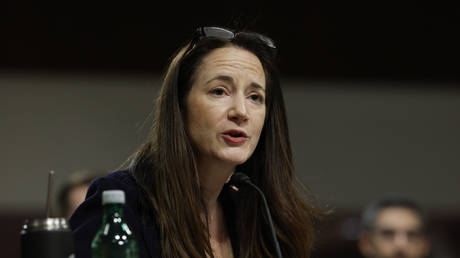
China’s assistance has “tilted momentum on the battlefield in Moscow’s favor,” Director of National Intelligence Avril Haines has told senators
Russian forces are steadily advancing in the Ukraine conflict, the US Director of National Intelligence, Avril Haines, told senators on Thursday. She also accused China of providing Russia with dual-use components, which has “tilted the momentum on the battlefield in Moscow’s favor.”
During a hearing at the US Senate Armed Services Committee on Global Threats on Thursday, Haines said Russia “is making incremental progress on the battlefield with the potential for tactical breakthroughs along the front lines in areas such as Donetsk and Kharkiv.”
The intelligence official added that Moscow’s economic position and rearmament efforts have led Russian President Vladimir Putin to believe that “domestic and international trends are in his favor.”
“Putin has for months indicated a willingness to enter into talks with Ukraine and the United States about the future for Ukraine but without any indication that he is willing to make significant concessions,” Haines added.
She further claimed that an intensifying campaign of Russian airstrikes is designed to break Kiev’s will and demonstrate there is no “plausible path to victory” for Ukraine.
This strategy is also disrupting Kiev’s military logistics and defense industry capabilities, Haines explained, adding that aerial bombardments are “likely to continue, and the war is unlikely to end any time soon.”
The US intelligence chief told senators that President Putin continues to see NATO enlargement and Western support to Ukraine as proof that the US and its European allies “seek to restrict Russian power.” This perception supposedly translates into an ever-growing military budget for Moscow.
Last month, Russian Defense Minister Sergey Shoigu stated that Moscow’s forces had seized the initiative on the battlefield and had been making territorial gains in Donbass.
Around the same time, Kremlin spokesperson Dmitry Peskov insisted that the recently approved $61 billion US aid package for Ukraine “won’t change the dynamics on the front line.”
In an interview with The Economist published on Thursday, Vadim Skibitsky, the deputy head of Ukraine’s GUR military intelligence agency, predicted that Russia would launch a major offensive by the end of May or the beginning of June, with Kiev still suffering from weapons shortages. He also acknowledged that the fall of Chasov Yar, a major Ukrainian stronghold in Donetsk Region, was only a matter of time.




